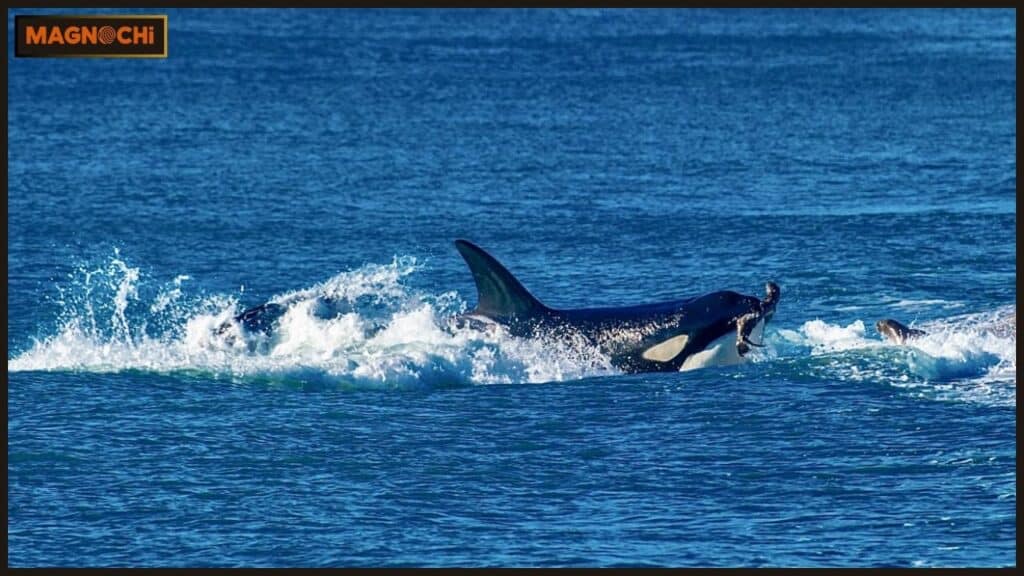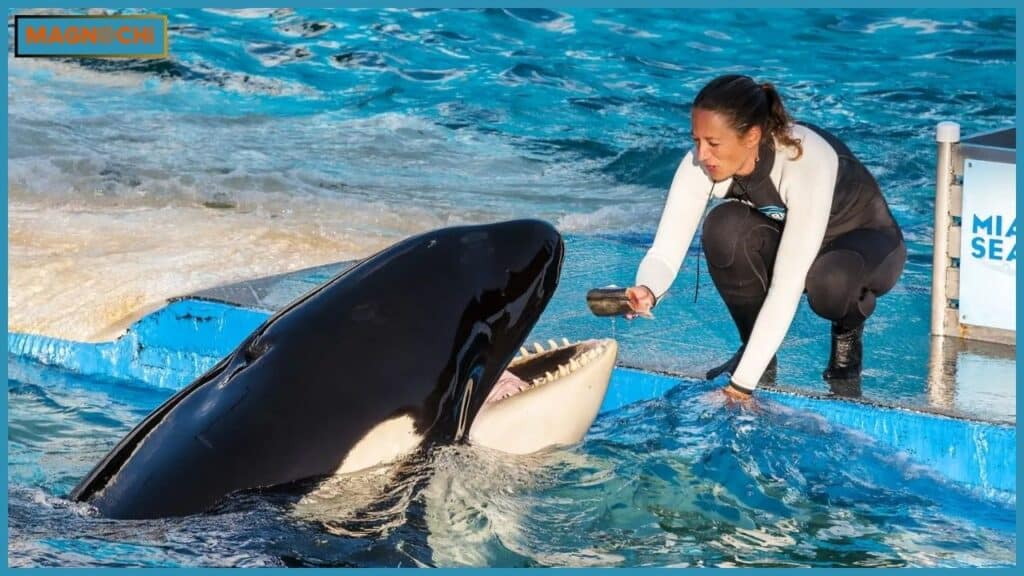Do Orcas Attack Humans? The orca, also known as the killer whale, is one of the most iconic animals in the ocean, celebrated for its intelligence, social behavior, and role as an apex predator.
With their sleek black-and-white appearance and formidable size, orcas have captured the imagination of people worldwide.
But despite their reputation as “killer whales,” the question remains: Do orcas attack humans?
In this article, we’ll dive deep into the world of orcas, exploring their behavior, intelligence, and interactions with humans both in the wild and in captivity.
We will examine the science, debunk common myths, and provide a comprehensive understanding of why these magnificent marine mammals behave the way they do.
Understanding Orcas: The Basics
Before addressing the question of whether orcas attack humans, it’s essential to understand these animals. Orcas (scientifically named Orcinus orca) are members of the dolphin family.
However, despite being dolphins, they are the largest and most powerful species within this group. These marine mammals are apex predators, meaning they are at the top of the food chain, with few natural predators. [Do Orcas Attack Humans?]
Physical Characteristics
Orcas are among the largest marine mammals, with males growing up to 32 feet (9.8 meters) in length and weighing around 22,000 pounds (10,000 kg). Females, being smaller, usually reach lengths of about 23 feet (7 meters) and weigh roughly 8,000 pounds (3,600 kg).
Their distinctive black-and-white coloration helps them blend into their environment when hunting, making them formidable predators.
The dorsal fin of an orca is one of its most recognizable features, with males having a tall, triangular fin that can reach up to 6 feet (1.8 meters) in height. In contrast, females and younger orcas have a smaller, curved fin.
This powerful body structure enables orcas to move through the water at incredible speeds, with some individuals reaching speeds of up to 34.5 mph (55.5 km/h). [Do Orcas Attack Humans?]
Another interesting feature is their teeth. Orcas have large, sharp teeth capable of gripping and tearing apart their prey. Their jaws are incredibly strong, allowing them to capture a variety of marine animals, including seals, squid, fish, and even large whales.
Social Structure and Behavior
Orcas are highly social animals that live in pods, which are groups made up of family members. These pods can consist of just a few individuals or up to 50 or more, depending on the size of the family group.
Orca pods are led by a matriarch, the oldest female, who guides the pod’s behavior and decisions. These social structures are crucial for the survival of orcas, as they rely on cooperation to hunt and protect one another.
Within the pod, orcas exhibit complex behaviors, such as social bonding, play, and even problem-solving. Orcas work together in coordinated hunting strategies, using their intelligence to capture prey.
For example, some pods in colder regions use waves to knock seals off ice floes, while others work as a group to chase down schools of fish. Hunting techniques vary depending on the pod’s location and preferred prey. [Do Orcas Attack Humans?]
One of the most fascinating aspects of orca behavior is their communication. Orcas use a wide range of vocalizations including whistles, clicks, and calls to communicate with one another.
These vocalizations help maintain social bonds, coordinate hunting efforts, and even aid in navigation in dark waters. Additionally, orcas are known to display empathy and emotional bonds, which are rare in the animal kingdom.
Intelligence and Communication
Orcas are renowned for their high level of intelligence. They possess cognitive abilities that rival those of humans and other great apes. Researchers have observed orcas exhibiting problem-solving skills, using tools, and displaying social learning the ability to learn behaviors by observing others.
One of the most compelling aspects of orca intelligence is their ability to adapt. Orcas have been observed altering their hunting methods based on new information. For example, some pods have been known to use social learning to pass down hunting techniques through generations, while others can quickly learn new behaviors when faced with a change in their environment.
Moreover, orcas have an extensive repertoire of vocalizations, with different pods often having their own distinct dialects. These vocalizations are believed to be a crucial part of orca social interaction and communication, allowing them to coordinate activities such as hunting and migration.
Do Orcas Attack Humans in the Wild?
Despite their reputation as “killer whales,” there is little evidence to suggest that orcas pose a significant threat to humans in the wild. While orcas are capable of hunting large marine animals, including seals, sea lions, and even whales, attacks on humans are exceedingly rare.

Historical Context
Historically, orcas have been respected and even revered by indigenous cultures. In many parts of the world, orcas are seen as symbols of strength and wisdom, often portrayed in mythology and stories. There is no widespread evidence suggesting that orcas were considered a threat to humans in the past, further underscoring their generally peaceful nature toward people.
In fact, the name “killer whale” is somewhat misleading. It was originally coined by ancient sailors who observed orcas attacking other whale species. However, these attacks were not driven by a need to hunt humans. Instead, orcas preyed on other marine animals as part of their natural hunting behavior.
Modern-Day Encounters
In modern times, human encounters with orcas in the wild are typically peaceful. Whale-watching tours in regions like Alaska, Canada, and New Zealand offer people the chance to witness orcas in their natural habitat without significant risk. These tours are generally safe, as orcas tend to avoid human activity, rather than attack it. [Do Orcas Attack Humans?]
That being said, there have been a few reported encounters between orcas and humans. Most of these incidents have been non-aggressive. Orcas are curious animals and, in some cases, they have approached boats or surfers, perhaps out of curiosity rather than aggression. However, in all but a few rare cases, these interactions have been non-threatening.
Case Studies of Wild Orca Encounters
- Kayak Incident in California (2005): In this widely discussed case, a group of kayakers had an unexpected encounter with a pod of orcas off the coast of California. The orcas surrounded the kayaks, but the humans involved were unharmed. Experts believe the orcas were investigating the kayaks out of curiosity, as they are naturally inquisitive animals.
- Snorkeler Incident in New Zealand (2019): A snorkeler in New Zealand had a close interaction with an orca, but once again, the encounter did not result in any harm. The orca appeared to be observing the snorkeler, but there was no sign of aggression. The event raised questions about orca curiosity and the boundaries between humans and wildlife.
These cases highlight that, while orcas may engage with humans in the wild, they do not exhibit the aggressive behavior that their name might suggest. Most interactions are based on curiosity rather than predation.
Do Orcas Attack Boats?
While it’s extremely rare for orcas to attack boats, some incidents have been reported where orcas have been observed ramming boats or causing damage to small vessels. [Do Orcas Attack Humans?]
However, these attacks are usually not intentional or aggressive. Instead, they may occur when orcas feel threatened, trapped, or frustrated. These events are few and far between and should not be seen as evidence of orca aggression toward humans.
Orcas in Captivity: A Different Story
The situation changes when orcas are kept in captivity. Orcas held in marine parks or aquariums are often subject to stress, which can result in changes to their behavior.

Unlike in the wild, where orcas have the freedom to roam vast oceanic expanses, captive orcas are confined to small tanks, which can have a negative impact on their mental and physical well-being.
Stress and Confinement
Life in captivity can be incredibly stressful for orcas. They are social creatures that typically live in large pods in the wild, traveling long distances. [Do Orcas Attack Humans?]
In captivity, however, they are confined to relatively small tanks where they cannot exhibit their natural behaviors, such as hunting, socializing, or swimming freely. This confinement can lead to psychological distress and aggressive behavior.
Researchers have documented cases of orcas in captivity displaying signs of frustration and stress, which sometimes result in aggressive interactions with humans. For example, trainers have been attacked by orcas in marine parks, sometimes with fatal consequences.
The most notorious case involved Tilikum, an orca at SeaWorld who was involved in the deaths of three individuals during his time in captivity. Tilikum’s case highlighted the potential dangers of keeping such intelligent and powerful animals in confinement.
High-Profile Captivity Incidents
Several notable incidents have occurred in marine parks that underscore the risks of keeping orcas in captivity. Some of the most significant cases include:
- Tilikum at SeaWorld: Tilikum’s involvement in the deaths of three people, including a SeaWorld trainer, led to widespread criticism of orca captivity. The case was featured in the 2013 documentary Blackfish, which sparked a global debate on the ethics of keeping orcas in captivity.
- Keto at Loro Parque: Keto, an orca at Loro Parque in Spain, was involved in aggressive incidents toward trainers, raising concerns about the welfare of orcas in captivity.
These incidents suggest that captivity stress can lead to dangerous behavior in orcas, as they are often unable to express their natural instincts and behaviors.
Ethical Considerations: The Debate Over Orca Captivity
The ethics of keeping orcas in captivity is one of the most contentious issues surrounding these marine mammals. On the one hand, proponents argue that captivity allows for educational opportunities and conservation efforts, providing humans with a chance to learn about these incredible creatures.
On the other hand, critics argue that keeping orcas in captivity is inhumane, as it denies them the ability to live freely and interact with their natural social groups. [Do Orcas Attack Humans?]
The Impact of Captivity on Orcas
Captivity has a profound impact on the physical and mental health of orcas. In the wild, orcas live in large, complex social groups, traveling vast distances across oceans. In
captivity, they are confined to small tanks, where they often suffer from depression, stress, and physical health problems.
Studies have shown that orcas in captivity are more likely to experience health problems such as dorsal fin collapse (a condition that is almost never seen in wild orcas), tooth wear, and infections. These health issues highlight the dangers of keeping such large, complex animals in confined spaces.
The Ethical Dilemma
The ethical dilemma surrounding orca captivity centers on whether the educational benefits and conservation efforts outweigh the negative effects on the animals’ welfare. [Do Orcas Attack Humans?]
While some argue that keeping orcas in captivity is necessary for research and public education, many believe that orcas should not be held in captivity due to the harm it causes to their physical and mental well-being.
The Media’s Role in Shaping Public Perception of Orcas
The portrayal of orcas in the media has contributed to their reputation as “killer whales.” This sensationalized image has influenced public perception, causing many people to view orcas as aggressive, dangerous animals.
The “Killer Whale” Misnomer
The term “killer whale” was first used by ancient sailors who observed orcas hunting other whales. However, this term is misleading, as orcas do not typically target humans. In fact, orca attacks on humans are extremely rare, and most encounters are peaceful or based on curiosity.
Media Sensationalism
Media outlets often sensationalized orca attacks, portraying them as more dangerous than they actually are. This exaggeration fuels misconceptions and fear about these marine mammals. In contrast, wild orcas are much more likely to avoid humans than to engage in aggressive behavior.
The Role of Orcas in Marine Ecosystems
Orcas are apex predators, meaning they sit at the top of the food chain in marine ecosystems. They play a vital role in maintaining the biodiversity of the oceans by regulating the populations of their prey species.
Apex Predators
As apex predators, orcas help control populations of seals, sea lions, fish, and even other whales. By keeping these populations in check, orcas prevent any single species from becoming too dominant, thus maintaining balance in the marine ecosystem.
Ecological Impact
Orcas’ role as apex predators has a far-reaching impact on the health of the oceans. By controlling prey populations, orcas indirectly support the health of other species and help maintain a balanced food web.
FAQs
Do Orcas Ever Attack Humans?
Orcas rarely attack humans in the wild. They are generally curious and avoid humans. Attacks are extremely uncommon and often misunderstood.
What to Do if an Orca Approaches You?
If an orca approaches, stay calm and avoid sudden movements. Maintain a safe distance, and do not provoke or challenge the animal. It’s best to observe from afar.
Would a Pod of Orcas Attack Humans?
Pod-based attacks on humans are unheard of. Orcas are social animals, and their behavior is generally non-aggressive towards humans. They may approach out of curiosity, but not for predation.
Do Killer Whales Seek Revenge?
Killer whales do not seek revenge. Their behaviors are driven by survival and social structure, not emotions like revenge. They hunt based on instinct, not retaliation.
Has an Orca Ever Saved a Human?
There are rare stories of orcas aiding humans. In some cases, orcas have been observed guiding swimmers to safety or preventing shark attacks, though these instances are rare.
Conclusion: Do Orcas Attack Humans?
Orcas, or killer whales, do not generally attack humans in the wild. While they are powerful predators, most interactions with humans are peaceful and driven by curiosity rather than aggression. In the wild, orcas tend to avoid humans.
In contrast, orcas in captivity can act aggressively due to stress and confinement. The conditions in marine parks often lead to psychological and physical health issues, which have resulted in incidents with humans. To protect orcas, it’s crucial to focus on their well-being and ensure they remain in their natural habitats. [Do Orcas Attack Humans?]









